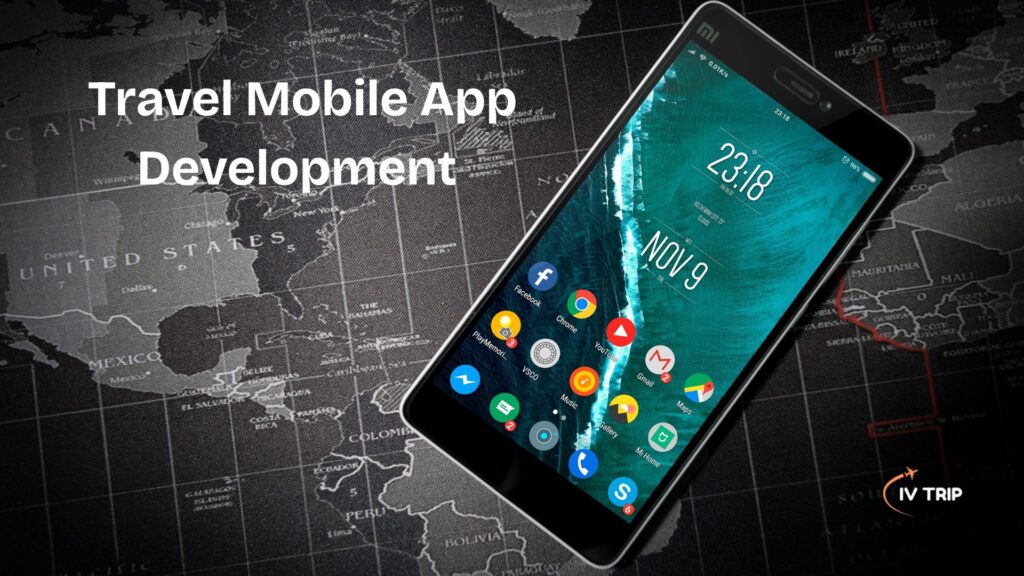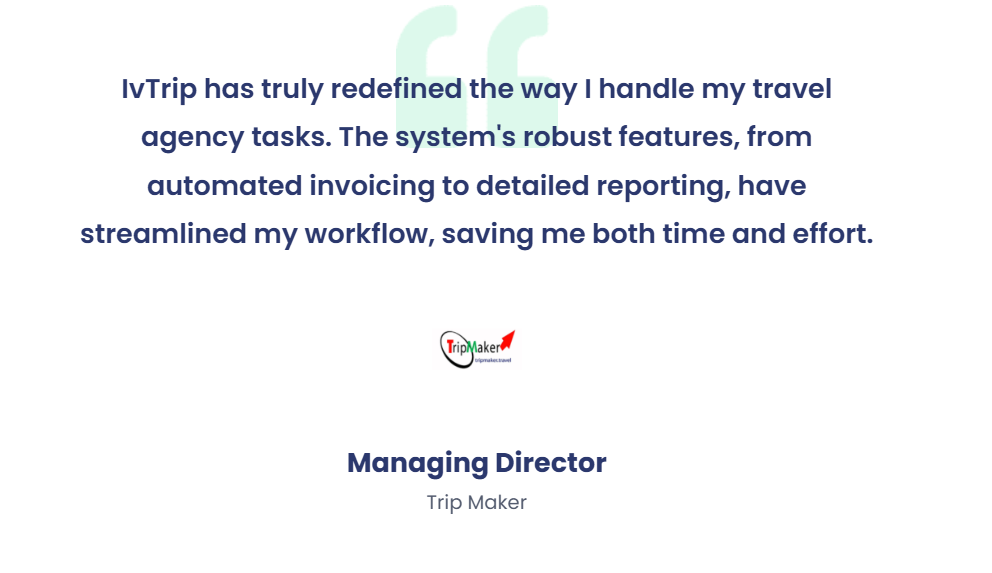The Powerful Evolution of Mobile Apps in Travel

In today’s fast-paced, digital-first world, the travel industry is undergoing a revolutionary shift. One of the most transformative factors contributing to this change is the rise of travel mobile app development. These apps are no longer just a value-added service—they are becoming the backbone of travel agency operations.
From streamlining bookings to providing personalized user experiences, travel mobile apps are fundamentally changing how travel agencies connect with their customers, deliver services, and stay competitive. This guide explores the complete evolution of mobile apps for travel agencies, offering valuable insights into trends, technology, costs, and opportunities.
As IV Trip, one of Bangladesh’s premier travel agency software solutions, we’re excited to guide you through this journey and help you leverage mobile technology for your business.
Introduction to Travel Mobile App Development
Travel mobile app development involves creating software applications tailored for smartphones and tablets, designed to facilitate various aspects of travel—from planning and booking to real-time support and post-trip engagement.
These apps integrate various features, including booking engines, maps, itinerary planners, payment gateways, and customer service modules. In 2025, with the increasing demand for convenience and real-time solutions, travel mobile apps are a necessity for any serious travel business.
The Early Days: Travel Apps in the 2000s
In the early 2000s, mobile phones were basic, and internet connectivity was slow and limited. At that time, most travel arrangements were made through physical offices or desktop-based websites. Early travel applications were simplistic—limited to weather forecasts, currency converters, or basic travel guides.
As smartphones became more advanced, developers began to explore the potential of mobile apps. These early versions laid the groundwork for more robust, interactive, and intelligent applications that we see today.

Milestones in Travel Mobile App Development
Travel mobile app development has seen consistent innovation over the years:
- 2010–2012: The introduction of GPS-enabled apps revolutionized the way travelers navigated destinations. Apps like Google Maps and mobile hotel booking platforms like Booking.com began to rise.
- 2013–2015: Real-time data integration allowed users to easily check flight statuses, weather conditions, and accommodation availability. Mobile payment features also emerged.
- 2016–2018: Artificial intelligence made its debut with chatbots providing 24/7 support. Predictive analytics began personalizing travel suggestions based on user history.
- 2019–2021: Voice-activated travel assistance gained popularity. Travelers started using Amazon Alexa or Google Assistant to book flights and get updates.
- 2022–2025: The latest phase includes AR/VR for virtual destination previews, blockchain for secure and transparent transactions, and the emergence of super-apps that combine multiple services into one seamless platform.
Key Features of Modern Travel Apps
Modern mobile apps for travel agencies are loaded with powerful features to enhance user experience and agency efficiency:
- Real-time Booking Engines: Allow users to book flights, hotels, transport, and experiences directly through the app, improving conversion rates and user satisfaction.
- Custom Itinerary Builders: Enable travelers to create, edit, and share itineraries with drag-and-drop simplicity. These tools often include maps, hotel details, and syncing capabilities.
- Geo-location and weather Integration: Based on the traveler’s current location, deliver personalized suggestions for nearby attractions and provide accurate weather updates.
- AI-driven Recommendations: AI-driven recommendations suggest destinations, hotels, and activities based on user behavior, search patterns, and preferences, making the planning process seamless.
- Push Notifications: Keep travelers updated with booking reminders, promotional offers, and alerts for delays or travel advisories.
- In-App Chatbots: Provide 24/7 support using AI to resolve queries, assist with bookings, and even upsell services.
These features are key to staying competitive and satisfying increasingly tech-savvy travelers.

Benefits of Travel Mobile Apps for Agencies
- Enhanced Customer Engagement: Mobile apps create direct lines of communication with users through instant messaging and timely notifications. Agencies can promote exclusive offers, new packages, or last-minute deals that users see immediately.
- Streamlined Operations: Integrating APIs with global distribution systems (GDS), hotel booking engines, and payment gateways allows for automation that reduces manual errors, speeds up processes, and ensures accurate reporting.
- Increased Bookings: The intuitive interfaces and fast navigation of mobile apps improve the booking experience, which encourages users to complete reservations and repeat the process for future trips.
- Real-time Analytics: With built-in analytics tools, agencies can gather behavioral data, track KPIs, and use insights to refine marketing strategies, adjust offerings, and improve the overall user journey.
- Brand Loyalty: A customized mobile app builds brand identity and encourages customer retention. Loyalty programs, app-only discounts, and personalized rewards make users more likely to return.
Popular Technologies Driving Innovation
Travel mobile app development is powered by a range of advanced technologies:
- Artificial Intelligence (AI): Enables apps to provide innovative search options, intelligent travel suggestions, and conversational interfaces through chatbots.
- Augmented Reality (AR): Offers immersive previews of destinations, allowing travelers to explore cities, hotels, and attractions before booking.
- Internet of Things (IoT): Enables smart connections with hotel rooms, transportation, and luggage. For example, users can control hotel room temperature from their app.
- Blockchain: Ensures secure, transparent transactions, prevents booking fraud, and allows for decentralized travel reviews and loyalty systems.
- Progressive Web Apps (PWA): PWAs load quickly, work offline, and provide a native app-like experience without needing app store downloads. This makes them ideal for travelers with limited connectivity.
These innovations are making travel experiences smarter, safer, and more connected.

Trends Shaping the Future of Mobile Apps for Travel Agencies
Several forward-looking trends are driving the evolution of mobile apps for travel agencies:
- Super Apps: These all-in-one apps bundle flights, accommodations, food delivery, insurance, and customer service under one ecosystem, simplifying user interaction.
- Eco-Conscious Travel: Apps now help users find green-certified hotels, monitor CO2 emissions for flights, and donate to environmental causes directly from the platform.
- Voice Search & Virtual Assistants: Siri, Alexa, and Google Assistant integrations make booking and itinerary management faster and more intuitive.
- Offline Capabilities: This feature enables users to view itineraries, access local maps, and use key features without the internet—a critical asset for remote or international travel.
- Hyper-Personalization: Leveraging user data, AI crafts unique travel experiences with recommendations, targeted content, and real-time support based on individual needs and preferences.
Staying ahead of these trends ensures that agencies can offer leading-edge services and attract modern travelers who demand convenience and customization.
Common Challenges and Solutions
| Challenge | Solution |
| Data security | Implement advanced encryption, two-factor authentication |
| App performance | Use scalable cloud infrastructure and regular testing |
| High development costs | Opt for MVP development and agile methodologies |
| User retention | Add loyalty rewards, gamification, and regular updates |
Best Practices for Travel Agencies Developing Apps
- Conduct market and user research
- Use intuitive UI/UX design
- Focus on performance optimization
- Integrate chatbots for 24/7 support
- Test rigorously before launch
- Update features regularly
Our team at IV Trip follows these best practices religiously, ensuring every client gets an app that performs at the highest standard.

IV Trip’s Contribution to the Travel Tech Revolution
As a leading travel agency software provider in Bangladesh, IV Trip empowers agencies with:
- White-label travel mobile app solutions
- Integrated booking engines
- CRM & ERP modules
- API connectivity with leading GDS providers
- Cloud-based dashboards and analytics
Visit our features Page to explore our services or schedule a demo.

Case Studies & Success Stories
Real-world examples highlight the measurable benefits of investing in travel mobile app development. Below are two powerful success stories that demonstrate how mobile apps have transformed travel agencies into growth-driven, customer-centric businesses.
TripMaker (Dhaka, Bangladesh)
TripMaker, a mid-sized travel agency based in Dhaka, partnered with IV Trip to launch a fully integrated mobile app tailored to their business needs. The app featured real-time booking systems, dynamic itinerary planning, and integrated payment gateways.
Results:
- Monthly bookings increased by 200% within 6 months.
- Customer retention improved by 30% due to the app’s loyalty program and push notification engagement.
- Operational efficiency increased as staff could manage customer inquiries and updates directly through the app’s backend dashboard.
This transformation positioned TripMaker as a digital-first travel service provider, attracting a younger, tech-savvy customer base.
Frequently Asked Questions
- What is travel mobile app development?
Travel mobile app development is the process of designing, building, and maintaining mobile applications that assist users in planning, booking, and managing their travel experiences. These apps often include features like real-time booking, GPS navigation, and itinerary tracking.
- Why is travel mobile app development important for agencies?
Developing a mobile app allows travel agencies to stay competitive by offering convenient, personalized, and 24/7 accessible services. Mobile apps for travel agencies can significantly boost bookings, improve customer engagement, and streamline internal operations.
- How has travel mobile app development evolved over the years?
The evolution of travel mobile apps began with basic flight and hotel booking features. Today, they incorporate AI for personalization, AR for immersive experiences, and blockchain for secure payments—making them a complete digital travel assistant.
- What are must-have features in a modern travel mobile app?
Some essential features include:
- In-app bookings (flights, hotels, tours)
- Real-time updates and notifications
- GPS-based navigation
- AI-driven recommendations
- Secure payment gateways
- Offline access to itineraries
- How do mobile apps benefit travel agencies in Bangladesh?
Mobile apps for travel agencies in Bangladesh help them expand their reach, automate bookings, and compete globally. IV Trip, for instance, provides localized, scalable app solutions tailored for regional and international markets.
- How much does it cost to develop a travel mobile app?
The cost depends on features, platform (Android/iOS), and complexity. Basic apps may cost $10,000–$20,000, while advanced apps with AI or AR can exceed $50,000. IV Trip offers budget-friendly solutions for travel agencies in South Asia.
- What technologies are used in travel mobile app development?
Popular technologies include:
- React Native or Flutter for cross-platform apps
- Firebase and AWS for backends
- APIs from GDS providers like Amadeus or Sabre
- AI/ML for chatbots and trip planning
- AR/VR for virtual tours
- Can travel mobile apps work offline?
Yes. Modern travel apps often offer offline access to itineraries, maps, and booking details, which is crucial for users traveling in areas with poor connectivity.
- How do mobile apps improve the travel experience for users?
They provide convenience, real-time updates, personalization, and reduced manual effort. From last-minute bookings to discovering hidden gems at a destination, mobile apps enhance the overall travel experience.
- Does IV Trip offer custom mobile app development services?
Yes! IV Trip specializes in creating tailored mobile apps for travel agencies, ensuring each app aligns with the client’s brand, target market, and operational needs. Contact us today for a free consultation.
The evolution of travel mobile app development has transformed the tourism sector beyond recognition. From basic functionalities to AI-powered experiences, travel apps are now the lifeblood of modern agencies.
At IV Trip, we’re proud to lead this digital revolution in Bangladesh.
Ready to build your travel app?
Contact IV Trip today to schedule a free consultation and see how we can take your travel agency to the next level!


